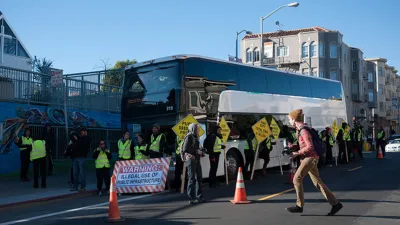A new study has shown that moving tech shuttle stops from neighborhoods to conform to a new "hub plan" would result in a drop in bus ridership, with most former riders resorting to driving their own vehicles to their Silicon Valley workplaces.

"Changing San Francisco’s corporate shuttle bus system from one with shared stops scattered across the city to one employing a smaller collection of hubs would drive thousands of tech commuters into their cars and choke streets and freeways, a report [PDF] concludes," reports Michael Cabanatuan, transportation reporter for the San Francisco Chronicle.
The current shuttle system has come under fire from residents, who complain the buses clog city streets, and activists, who say the buses enable higher-paid workers to live in the city, resulting in increased housing prices and a rise in evictions.
Under the program, the corporate shuttle buses, which haul about 8,200 workers between San Francisco and jobs at tech and biotech firms on the Peninsula and in Silicon Valley, are allowed to stop at 125 locations and are restricted to larger streets.
According to the key findings of the San Francisco Municipal Transportation Agency report, "Shuttle ridership would drop between 24 to 45 percent, and nearly all those prior shuttle riders would switch to driving, resulting in 1,780 to 3,300 more cars on the road each day." The result would be an increase in vehicle miles traveled, causing a setback for the city's emission reduction and Vision Zero goals.
In another commuter shuttle report released this month, the mid-program evaluation [PDF], the SFMTA found that shuttle ridership has increased 15 percent since the initial pilot began. The Bay Area Council, who represent the region’s business community, was quick to point to both reports, writing it would be a "disaster" to switch to the centralized model.
But the report did not convince shuttle critic Erin McElroy of the Bay Area Anti-Eviction Mapping Project, notes Cabanatuan.
“Our studies have shown that evictions and rents have gone up in areas near tech bus stops,” said McElroy. “It seems as if the city is subsidizing the lives of people who ride the luxury commuter shuttles at the expense of those who don’t.”
Officials would argue that last point, as the new program ensures that the tech buses are charged for using Muni bus stops. Other findings of the midterm evaluation included:
- A 23 percent reduction in shuttles stopping in Muni zones between the Pilot Program and now (2302 to 1783)
- A 129% increase in the number of citations issued each month between the Pilot Program and now (72 to 165)
According to a July post by James Brasuell, the decision by SFMTA to reduce shuttle stops in San Francisco resulted in a 16 percent increase in solo car commuting to Facebook.
Also in Planetizen:
- Better to Appease Irate Neighbors Than Decrease Car Commuting, July 14, 2016
- Facebook: Solo Commutes Increasing After Loss of Tech Shuttle Stops, July 11, 2016
- Tech Shuttle Pilot Might Stick Around San Francisco, September 10, 2015
FULL STORY: Cutting tech shuttle stops will add cars in SF, report says

Analysis: Cybertruck Fatality Rate Far Exceeds That of Ford Pinto
The Tesla Cybertruck was recalled seven times last year.

National Parks Layoffs Will Cause Communities to Lose Billions
Thousands of essential park workers were laid off this week, just before the busy spring break season.

Retro-silient?: America’s First “Eco-burb,” The Woodlands Turns 50
A master-planned community north of Houston offers lessons on green infrastructure and resilient design, but falls short of its founder’s lofty affordability and walkability goals.

Test News Post 1
This is a summary

Analysis: Cybertruck Fatality Rate Far Exceeds That of Ford Pinto
The Tesla Cybertruck was recalled seven times last year.

Test News Headline 46
Test for the image on the front page.
Urban Design for Planners 1: Software Tools
This six-course series explores essential urban design concepts using open source software and equips planners with the tools they need to participate fully in the urban design process.
Planning for Universal Design
Learn the tools for implementing Universal Design in planning regulations.
EMC Planning Group, Inc.
Planetizen
Planetizen
Mpact (formerly Rail~Volution)
Great Falls Development Authority, Inc.
HUDs Office of Policy Development and Research
NYU Wagner Graduate School of Public Service

























